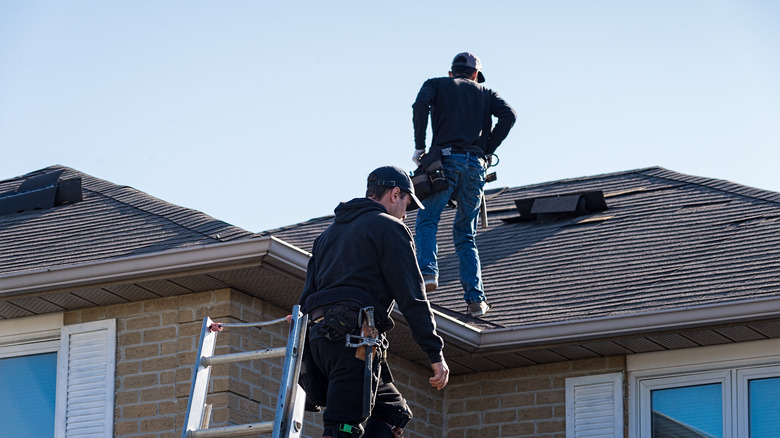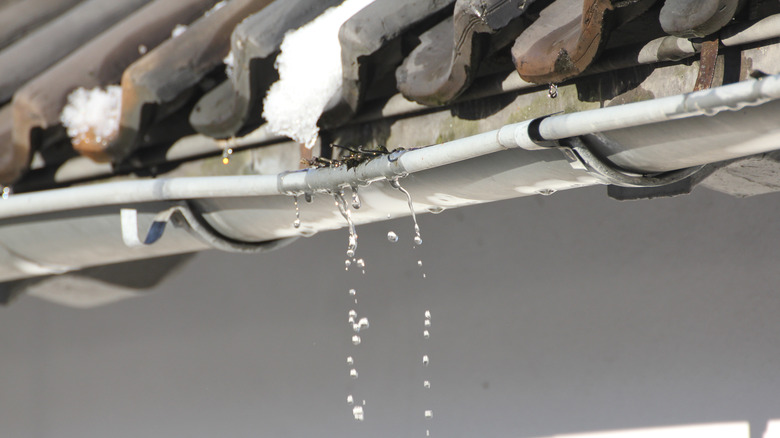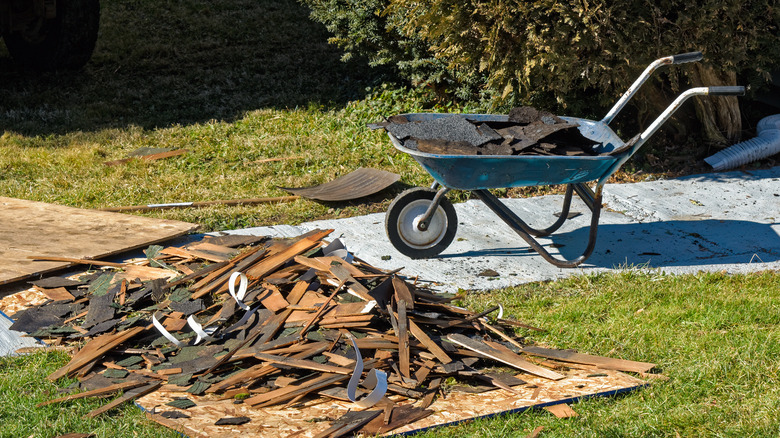11 Questions To Ask Your Roofing Contractor
The roof is one of the most important parts of your home. As Custom Roof Company notes, it protects your home against rain, snow, sun, wind, and other weather elements and insulates your home to ensure comfortable temperatures. They also help keep energy bills more manageable.
For all of these reasons, combined with the expenses associated with installing a new roof, you want to take this home improvement project seriously. It is imperative to take some time to make sure you choose a contractor that will not only provide high-quality materials but will also install them properly and stand by their work if any issues arise. The questions below are designed to help you ensure that the roofing contractor you end up hiring is the best choice for your job. Use these questions to guide your conversations with different contractors to learn more about their company and experience, the level of service you can expect to receive, and other essential details that will help you through the process.
Is your company licensed and insured?
It is important to choose a roofer who is licensed and insured. Working with a licensed professional decreases the chances that you'll have to deal with a shoddy or low-quality installation job. States set specific requirements that roofers must meet to receive a license. As Contractors Liability shares, this typically involves passing an exam and acquiring insurance. However, these requirements may vary by state.
Beyond this, Trico Exteriors explains that choosing a licensed roofing company also offers protection against questionable or unethical business practices. For example, licensed roofers cannot require full payment for a job upfront. Instead, state licensing boards set the down payment amount — typically about 10% of the total cost — and the roofers must stick to this amount. Unlicensed companies may not abide by these rules and could make unfair payment requirements and then fail to follow through with the timely completion of the job.
Trico Exteriors points out additional benefits of working with a licensed company. For one, licensed roofers are required to provide customers with an official contract. Written contracts are binding documents that outline the work the company is promising to complete, the materials they will be using, and when the work will be started and completed. This document can support you if the contractor ends up straying from what was promised.
Licensed roofers will also carry workers' compensation and liability insurance. In the event that the contractor gets injured while working on your roof or causes any damage to your property, their insurance will cover the necessary medical or repair bills. If you work with an uninsured contractor, you could be responsible for these bills.
What certifications do you hold?
Roofing manufacturers offer certification to a handful of contractors in each area. Some companies may hold several manufacturer certifications, while others may not have any. Straight Line Roofing & Construction explains why looking for a roofing company with manufacturer certifications is important. These certifications are not easy to receive and are not something that contractors can simply request and then be granted. Shingle manufacturers don't want to put their seal of approval behind just any contractor; they want to be confident that the companies they select represent the best of the best to make sure that customers are satisfied with their products and how they are installed.
Therefore, contractors are only provided these certifications after they go through an in-depth approval process by the manufacturer. Not only must the contractors show that they have a deep understanding of the manufacturer's products, but they must also be able to support their knowledge of how to install these products properly. Plus, manufacturers will only provide certifications to companies that have satisfied their state's licensing and insurance requirements. They also research the company's practices and customer service.
What warranties do you offer to back up your work?
Most shingle manufacturers offer 25- to 30-year warranties for standard asphalt shingles. While this sounds like excellent coverage, Brothers Services points out that these manufacturers' warranties only cover the roofing materials, not the workmanship. For this reason, you'll want to look for a roofing contractor that provides an additional warranty to cover their workmanship. These warranties differ — offer quite significantly — between contractors. Make sure to confirm whether the warranty that you are being offered covers the materials, the workmanship, or both. Once you get the answer, ask them to send it in writing. This way, you'll be able to compare different companies easily and will also have written documentation to refer back to if you encounter any issues in the future.
When you decide which roofing company you want to work with, schedule an inspection every year or two with your roofing contractor. This will allow them to address minor repairs, minimize the need for major repairs in the future, and help ensure that your warranty coverage remains intact.
Are you local to the area?
There are several reasons to look for a local roofing company, as Fortified Roofing highlights. Building and roofing codes can vary from one state or region to the next. Choosing a local roofing company will help ensure that your contractor is experienced with your area's specific code requirements and regulations. Climate can also vary based on location. Local roofers will have more experience with the weather in your area and will be better able to recommend the right type of roof.
With a local roofer, you may also be able to seek references from past clients to learn more about how their job went. Similarly, the roofing company will have a higher stake in keeping you as a satisfied customer. Because they want you to share positive, not negative, experiences with your friends and family in the area, they will be more likely to deliver exceptional customer service and follow through with their promises.
Can you share some references with me?
Any company can make itself look great online. Checking online reviews can provide insight into the company and its operations. They can be a great resource when starting your search and deciding which roofing contractors you want to reach out to for an initial estimate. However, these reviews do not always provide enough information to make a fully informed decision about which company you should hire for your job.
Bill Ragan Roofing Company shares that one of the best ways to learn about the actual quality of the workmanship and customer service that a particular company provides is to speak with some of the individuals who have used their services in the past. Hearing directly from someone can be very valuable in helping you decide whether you want to move forward with a particular company or if it would be best to work with someone else.
Always ask for references from a potential roofing company. If they are hesitant to share with you or try to explain why you can trust them without talking to their past clients, it should be a red flag. Companies who are proud of the work they have done in the past, and know that they lived up to their clients' expectations, will gladly share references.
Will you apply for a permit for the job?
In nearly all cases, a permit will be required when installing a new roof. Installing a new roof is a significant undertaking. As Eagle Watch Roofing explains, you will need a permit just as you would for other large undertakings, like making structural changes to the home, building an addition, or any other major renovations.
If you are only hiring a contractor to make minor repairs, such as replacing a few lost shingles, then no permit is required. This is not considered structural work. However, replacing the entire roof is considered structural work. While each county, city, or state may have slightly different regulations regarding when a permit is necessary, nearly all require building permits for any type of structural work.
Only licensed contractors (or homeowners completing the work themselves) are able to apply for building permits. This is yet another reason to be selective when searching for a roofing company and to only choose one that holds the proper licenses. If a contractor tells you that no permit is needed to replace your roof, they are likely not following the regulations of your city or state.
Do the gutters also need to be replaced?
Innovative Home Concepts explains that the gutters do not necessarily need to be replaced when a new roof is installed. However, it is a good idea to have them checked by your roofing contractor to determine whether now is the right time to replace them. If they are damaged or not performing properly, it may make sense to complete both jobs at the same time. Replacing both the gutters and roof together can cut down on the overall labor cost for the job and save you some money. You may also be able to finance both projects jointly.
According to Angi, there are signs you can look for to determine whether it is the right time to get new gutters. Some signs that indicate that the gutters need to be replaced include cracks, pooling water, breaks at the seams, rust, or fallen nails.
What measures do you take to protect the property around my home?
Tearing off an old roof can cause a lot of damage to a homeowner's property if it isn't done properly and steps aren't taken to protect the landscaping and other features in the yard. Ask your contractor about the steps they will take to ensure that your property isn't damaged and remains safe after the installation.
BoneDry Roofing explains four measures every roofing company should take to protect a customer's property. First, roofers should hang visqueen or tarps around the home to prevent shingles and other debris from the roof from damaging windows, siding, plants, or bushes. Next, responsible roofing companies should arrange to have a dumpster trailer onsite as they complete your roof. This provides a spot to dispose of the old shingles and other debris from your old roof, helping to ensure that they are not just simply left around the yard.
Even when these preventative measures are taken, it is still possible that some small debris or nails will find their way onto your yard or walkways. BoneDry Roofing stresses the importance of choosing a contractor that will work to ensure that your yard is left clean and free of any potential safety hazards. Once the roofing job is complete, the contractors should use a strong nail magnet to sweep over the entire yard and pick up any stray nails. Finally, once they are finished with the nail magnet, a good roofer will do a final clean-up to ensure that nothing has been missed and that your yard looks as it did before the installation.
How much will the job cost?
When talking to contractors about getting a new roof, be sure to get an estimate for the replacement cost. You may have heard that getting three estimates for any big project is a good idea. However, Nu Look Home Design recommends getting as many calculations as you need to feel comfortable about your decision.
When comparing estimates from multiple roofing contractors, make sure that one company isn't way out of line with the other quotes you've received. Coming in way too high (or even lower than others) could be a sign to consider a different company. Keep in mind that the cost to replace a roof can vary on several factors. You'll want to compare the estimates for your specific property instead of trying to compare with what a friend or family member was quoted. According to Forbes Home, some factors that will impact the cost of a new roof include the size of the roof, your location, and the materials you select. The average price for a new roof is $8,000. Most people spend between $5,400 and $11,200 for a new roof.
Is the price you quoted an estimate or fixed?
Before making a final decision about whether you want to work with a given roofing contractor, you should confirm whether the price they quoted is an estimate or a fixed price. Lee Reger Builds explores the differences between estimates and fixed-cost proposals. A fixed cost proposal is a contracted agreement with a set price to cover labor and materials. The contractor estimates the total amount of time the work will take to complete and measures to ensure they order the right quantity of materials. Even if the contractor takes more time than they estimated or needs to purchase new materials, the total due at the end of the project should remain the same.
On the other hand, an estimated cost proposal is not a set price. The contractor will provide you with an itemized list of the materials they need for the job and the amount of time they think it will take for them to complete it. However, if the job ends up taking longer than anticipated or more materials are needed, the total due at the end could end up being higher than what you were initially quoted.
While each option has pros and cons, Lee Reger Builds recommends working with contractors offering fixed-price quotes. These quotes are easier to understand, don't require as much oversight on the part of the customer, and ensure greater transparency throughout the project.
When will the work be completed?
You don't want to sign a contract with a company only to find out that they won't even be able to start installing your new roof for months. Before committing to work with a company, ask when they will be able to start your job. You will also want to ask how long they think it will take to install the new roof once they get started.
As Above Roofing explains, several factors can impact the overall time it will take to replace a roof. Some of these factors include the weather, the size of your roof, the types of materials used, how steep the roof is, and whether there is any structural damage or other repairs that need to be addressed. The roofing companies you speak with should take these factors into account when scheduling your job and providing information about their timeline to complete it. However, most roofs take between one and three days to install, but some projects may take up to two weeks.











